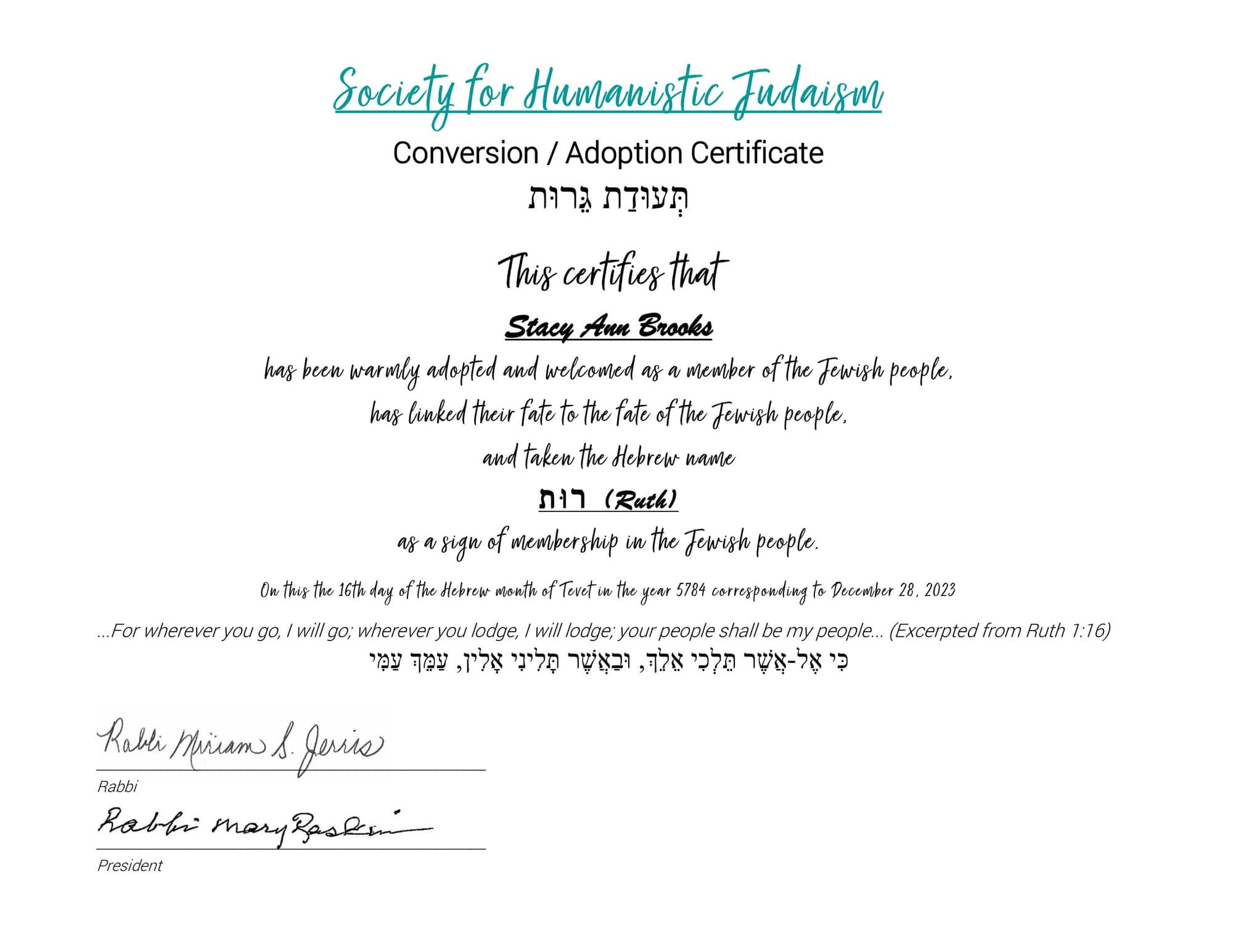New year, new name

I spent most of 2023 converting to Judaism.
It started in mid-March, when I interviewed the founder of Challah Back Girls for my article about how her bakery supports social and racial justice non-profit organizations by donating a portion of the proceeds from each loaf of challah. The way she spoke about how her Jewish values and faith informed her work resonated with me deeply, and it inspired me to research something I hadn't considered before—could I, as a former Catholic, erstwhile Unitarian Universalist, and longtime pantheist, convert to Judaism?
Because I'm a millennial, my research started on Wikipedia. I started reading about the beliefs and conversion processes for different Jewish denominations and eliminated them one by one until I came to Humanistic Judaism, the youngest and smallest of the United States' five Jewish denominations (the others, in order from most traditional to most progressive, are Orthodox, Conservative, Reform, and Reconstructionist).
There are only about 30 Humanistic Jewish congregations in North America, but one of them, Or Emet, happens to meet at a Jewish community center a 25-minute drive from my house. I attended Or Emet's information session for prospective members, and everything that was presented made a lot of sense. I ordered Judaism Beyond God by Humanistic Judaism founder Rabbi Sherwin T. Wine and read it cover to cover (it also made a lot of sense). I went to Or Emet's Humanistic Passover Seder, and for the first time since childhood I participated in a religious ritual that felt deeply spiritual and meaningful, but without requiring me recite a bunch of language about God and the afterlife that I didn't actually believe. I subscribed to the Judaism Unbound podcast and the daily newsletter from My Jewish Learning. I started lighting Shabbat candles on Friday and attended Rosh Hashanah and Yom Kippur services. I began attending a weekly virtual Mi Sheberach service (a traditional prayer for healing, both for individuals and humankind). I joined Or Emet, my local Humanistic Jewish congregation. I started regularly baking challah. I celebrated Hanukkah.
And then, in the final days of 2023, I officially converted. Humanistic Judaism is intentionally inclusive, with a low barrier to entry, so they don't ascribe to many of the formal educational and rituals other denominations require. Instead, you join your local congregation (or if there isn't a congregation in your area, the Society for Humanistic Judaism, the umbrella organization). You submit a personal statement to the Society's rabbi about why you want to convert. And you choose a Hebrew name, which is used in certain religious contexts.
I had already joined a congregation, and as a professional writer who had spent dozens of hours reflecting on why I wanted to convert, writing a personal statement was squarely in my wheelhouse. The hard part was choosing a Hebrew name.
Since one of the most appealing things about Judaism for me is its thousands of years' worth of history and tradition, I wanted to choose a Biblical Hebrew name. Named women are underrepresented in the Bible, but there are still quite a few to pick from (approximately 130). The problem was that none of them seemed like the right fit.
Major Biblical women tend to fall into two categories. First, there are the matriarchs and other figures whose stories center around their role as mothers: Eve, Sarah, Rebecca, Rachel, Leah, and Hannah. Second, there are the women who I think of, with all due respect, as badass Jewish heroines. There's Esther, a woman living in the Persian diaspora who becomes queen and saves the Jewish community from a genocide orchestrated by a scheming court official. There's Judith, who assassinates an Assyrian general to save her town from invasion. There's Miriam, who as a child saves her younger brother Moses, and as an adult serves as a prophet who helps deliver the Jews from exile in Egypt. There's Deborah, a prophet and judge whose wisdom helps liberate the Jewish people from oppression.
Neither of those archetypes ring true to my experience. I'm child-free by choice, so choosing a woman primarily known for her role as a mother didn't feel like an appropriate fit. I admire the badass Jewish heroines, and probably, if I was converting in my early 20s instead of my mid 30s, would have chosen one of them as my namesake. But as I've gotten older, I've come to realize that I am a very ordinary, unremarkable person living a very ordinary, unremarkable life. I am not going to ascend to the royalty, assassinate a military leader, possess profound wisdom, or save my people from genocide. I am not a leader or a hero or a prophet. I am not the sort of person who ends up in historical accounts and religious scripture.
Then I remembered Ruth.
Since I was raised Catholic, I was introduced to Ruth as a dutiful daughter-in-law, the paradigm of feminine obedience. It sounded like a suspiciously tidy Biblical way to prop up the institutional patriarchy of the Catholic Church, and I never gave Ruth's story more than a cursory read.
In the Jewish context, Ruth is viewed through a somewhat different lens. The Ruth-as-dutiful-daughter-in-law characterization does exist. But more prominently, she is celebrated for her identity as a convert—Ruth was a Moabite woman who converted to Judaism and eventually became the great-grandmother of King David, who is admired for his leadership and whose lineage will eventually include the Messiah (in Christianity, one of the reasons Jesus is considered the Messiah is because he is a descendant of David). Under traditional Jewish law, Jewishness is passed down through the mother, so a convert's role as the Messianic foremother is validating and empowering to me as a Jew-by-choice (and I suspect many others, since Ruth is a popular Hebrew name among converts).
The Ruth-as-convert narrative was intriguing, so I decided to give the Book of Ruth a close reading. To summarize (if you like, you can read the whole thing for yourself via Sefaria, a free online library of Jewish texts), a man from Bethlehem flees Judah (an ancient Hebrew kingdom in modern-day Israel) due to famine, settling with his wife Naomi and two sons in the country of Moab (an ancient kingdom in modern-day Jordan). The sons marry Moabite women, one of whom is Ruth. Time passes. The husband and sons die, leaving Naomi and her daughters-in-law widows. Naomi decides to return to her homeland, and tells her daughters-in-law to stay in Moab, remarry, and live happy lives. One of them tearfully acquiesces. Ruth refuses.
Naomi tells her, "Your sister-in-law has returned to her people and her gods. Go follow your sister-in-law."
But Ruth stands firm. "Do not urge me to leave you, to turn back and not follow you. For wherever you go, I will go; wherever you lodge, I will lodge; your people shall be my people, and your God my God."
The passage continues, "When Naomi saw how determined she was to go with her, she ceased to argue with her."
The two women travel to Bethlehem, where Ruth takes the initiative to collect leftover grain after the harvest, providing for herself and Naomi. Eventually, and largely due to the encouragement of Naomi, Ruth becomes acquainted with and marries Boaz, Naomi's well-to-do-relative. Ruth gives birth to a son, who fathers a son, who fathers King David.
The Book of Ruth doesn't provide Ruth's thoughts or motivations about any of these developments, and there are aspects of the story in which she seems somewhat passive. For instance, does she become involved with Boaz because she wants to, or is she submitting to pressure from Naomi? But there are also elements of the story in which Ruth exhibits a great deal of agency. What stands out to me the most is the exchange with Naomi at the beginning, when Naomi tells Ruth to stay in Moab and Ruth flatly refuses. Ruth is a woman who is determined to choose her own destiny, even though it seems like the more challenging path—certainly, it would have be easier to stay in her homeland rather than to emigrate to Judah with her penniless mother-in-law.
We don't know why Ruth chose to leave Moab. Possibly it was religiously motivated. Maybe she felt a sense of moral responsibility to her mother-in-law. Perhaps she couldn't bear to stay in a place that was filled with memories of her late husband. It's possible that she simply wanted to see another part of the world and experience another culture. Maybe it was a little bit of all of those things. What's important is that she chose, and she was determined to carry out her decision, even when things got difficult.
Obviously, Ruth's identity as a convert resonates with me. But I also see her as a Jewish heroine that I can actually emulate—I can't realistically aspire to save my community from the machinations an evil court official as Esther did or lead the Israelites through the Red Sea like Miriam. The story of Ruth is about finding your own path and sticking to it, even if others urge you to live a more conventional life.
There have been many points in my life in which I chose to follow my own path instead of a more conventional road map. I've cobbled together a career as a self-employed professional writer. I'm polyamorous and share my life with my husband and my partner. I decided not to have children. And I became a Jew-by-choice.
Converting to a new faith is not easy (perhaps especially Judaism, due to antisemitism, the religion's stance against proselytizing, and its minority status in the United States). Becoming Jewish has been a profoundly humbling and overwhelming experience. But Ruth's determination gives me an example to live up to, and I'm honored to share her name.
